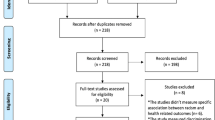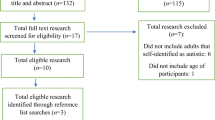Abstract
Purpose
The aim of this study was to investigate whether socio-demographic variables and physical disability (e.g. sensory impairment and mobility problems) were associated with self-reported stigma in people with intellectual disabilities (ID), and to examine whether age, sex and ethnicity modified the relationship between severity of intellectual disability and self-reported stigma.
Methods
229 participants with mild or moderate intellectual disabilities were recruited from 12 centres/sites in England from community intellectual disability services, day centres, supported housing schemes, voluntary organisations and invitation letters. Information on physical disability and socio-demographic variables were obtained using a structured data collection form. Self-reported stigma was measured using a validated questionnaire.
Results
Age was associated with self-reported stigma, with older adults reporting more stigmatising experiences. Participants with moderate intellectual disabilities were more likely to report being treated differently such as being made fun of and being treated like children. Physical disability such as sensory, mobility and speech problems were not associated with self-reported stigma. Gender modified the relationship between severity of ID and self-reported stigma as participants who were male and had moderate ID were more likely to report stigma compared to females with moderate ID. Categorical age also modified the relationship between severity of ID and self-reported stigma as older participants who had moderate ID were more likely to report stigma compared to younger people with moderate ID.
Conclusions
Older adults and those with moderate ID are potentially at higher risk of being targets of public stigma or are more likely to report stigma. Interventions to help individuals cope with stigma could be targeted to this group.


Similar content being viewed by others
References
World Health Organisation (1992) The ICD-10 classification of mental and behavioural disorders: clinical descriptions and diagnostic guidelines. World Health Organization, Geneva
Gordon PA, Feldman D, Tantillo JC, Perrone K (2004) Attitudes regarding interpersonal relationships with persons with mental illness and mental retardation. J Rehabil 70:50–56
Nagata KK (2007) The measurement of the Hong Kong-based ‘baseline survey of students’ attitudes toward people with disability’: cross cultural validation in Lebonon. Int J Rehabil Res 30:239–241
Sheik S, Pralat R, Reed C, Sin CH (2010) Don’t stand by. Hate Crime Research Report, Mencap. http://www.mencap.org.uk
Emerson E (2010) Self reported exposure to disablism is associated with poor self reported health and wellbeing among adults with intellectual disabilities in England: a cross sectional survey. Public Health 124:682–689
Ali A, Hassiots A, Strydom A, King M (2012) Self stigma in people with intellectual disabilities and courtesy stigma in family carers: a systematic review. Res Dev Disabil 33:2122–2140
Corrigan PW (2000) Mental health stigma as social attribution: implications for research methods and attitude change. Clinical Psychol Sci Pract 7:48–67
Corrigan P, Watson A (2002) Understanding the impact of stigma on people with mental illness. World Psychiatry 1:16–20
Time to Change (2008) Stigma shout: service user and carer experiences of stigma and discrimination. Time to Change, London
Social Exclusion Unit (2004) Mental health and social exclusion. ODPM, London
Time to Change (2009) Stigma of mental health makes finding work in recession more difficult. YouGov poll. London: Time to Change. http://www.time-to-change.org.uk/news/stigma-mental-health-makes-findingwork-recession-more-difficult-research-finds
Braddock D, Hemp R, Rizzolo M C, Coulter D, Haffer L, Thompson M (2005) The state of the states in developmental disabilities: 2005. Boulder and Washington, DC: University of Colorado, Department of Psychiatry and Coleman Institute for Cognitive Disabilities and American Association on Intellectual and Developmental Disabilities
Shaw L, MacKinnon J, McWilliam C, Sumsion T (2004) Consumerparticipation in the employment rehabilitation process: contextual factors and implications for practice. Work J Prevent Assess Rehabil 23:181–192
Corrigan P, Watson A, Barr L (2006) The self stigma of mental illness. Clin Psychol Sci Pract 9(35):53
Corrigan P, Kerr A, Knudsen L (2005) The stigma of mental illness: explanatory models and methods for change. Appl Prevent Psychol 11:179–190
Ritsher JB, Phelan JC (2004) Internalized stigma predicts erosion of morale among psychiatric outpatients. Psychiatry Res 129:257–265
Beart S, Hardy G, Buchan L (2005) How people with intellectual disabilities view their social identity: a review of the literature. J Appl Res Intellect Disabil 18:47–56
Chen C-H, Shu B-C (2012) The process of perceiving stigmatisation: perspectives from Taiwanese young people with intellectual disability. J Appl Res Intellect Disabil 25:240–251
Jahoda A, Markova I, Cattermole M (1988) Stigma and the self concept of people with mild mental handicap. J Ment Defic Res 32:103–115
Jahoda A, Markova I (2004) Coping with social stigma: people with intellectual disabilities moving from institutions and family home. J Intellect Disabil Res 48:719–729
Cunningham C, Glenn S (2004) Self awareness in young adult with Down Syndrome: 1. Awareness of Down Syndrome and disability. Intl J Disabil Dev Educ 51:335–361
Finlay WM, Lyons E (2000) Social categorizations, social comparisons and stigma: presentations of self in people with learning difficulties. Br J Soc Psychol 39:129–146
Cooney G, Jahoda A, Gumley A, Knott F (2006) Young people with intellectual disabilities attending mainstream and segregated schooling: perceived stigma, social comparison and future aspirations. J Intellect Disabil Res 50:432–444
Livingston JD, Boyd JE (2010) Correlates and consequences of internalized stigma for people living with mental illness: a systematic review and meta-analysis. Soc Sci Med 71:2150–2161
Logie C, Gadalla TM (2009) Meta-analysis of health and demographic correlates of stigma towards people living with HIV. AIDS Care 21:742–753
Ali A, Kock E, Molteno C, Mfiki N, King M, Strydom A (2015) Ethnicity and self-reported experiences of stigma in adults with Intellectual Disability in Cape Town, South Africa. J Intellect Disabil Res 59:530–540
Paterson L, McKenzie K, Lindsay B (2012) Stigma, social comparisons and self esteem in adults with an intellectual disability. J Appl Res Intellect Disabil 25:166–176
Szivos-Bach SE (1993) Social comparisons, stigma and mainstreaming: the self esteem.of young adults with a mild mental handicap. Ment Handicap Res 6:217–236
Dagnan D, Waring M (2004) Linking stigma to psychological distress: testing a social-cognitive model of the experience of people with intellectual disabilities. Clin Psychol Psychother 11:247–254
Petrovski P, Gleeson G (1997) The relationship between job satisfaction and psychological health in people with an intellectual disability in competitive employment. J Intellect Dev Disabil 22:199–211
Ali A, King M, Strydom S, Hassiotis A (2015) Self-reported stigma and symptoms of anxiety and depression in people with intellectual disabilities: findings from a cross sectional study in England. J Affect Disord 187:224–231
Ali A, Strydom A, Hassiotis A, Williams R, King M (2008) A measure of perceived stigma in people with intellectual disability. B J Psychiatry 193:410–415
Bahm A, Forchuck C (2008) Interlocking oppressions: the effect of a comorbid physical disability on perceived stigma and discrimination among mental health consumers in Canada. Health Soc Care Commun 17:63–70
Gary FA (2005) Stigma: barrier to mental health care among ethnic minorities. Issues Ment Health Nurs 26:979–999
Zamboni BD, Crawford I (2007) Minority Stress and sexual problems among African–American gay and bi-sexual men. Arch Sex Behav 36:569–578
Mizcock L (2012) The double stigma of obesity and serious mental illnesses: promoting health and recovery. Psychiatr Rehabil J 35:466–469
Samilov D (2004) Double discrimination: drug users living with HIV/AIDS. HIV AIDS Policy Law Rev 9:83–85
Emerson E, Hatton C (2008) Self reported wellbeing of women and men with intellectual disabilities in England. Am J Ment Retard 113:143–155
Corker E, Hamilton S, Henderson C, Weeks C, Pinfold V, Rose D, Williams P, Flach C, Gill V, Lewis-Holmes E, Thornicroft G (2013) Experiences of discrimination among people using mental health services in England 2008–2011. Br J Psychiatry Suppl 202(S55):s58–s63
McEvoy SC, Keenan E (2014) Attitudes towards people with disabilities—what do people with intellectual disabilities have to say? Br J Learn Disabil 42:221–227
Finlay M, Lyons E (1998) Social identity and people with learning difficulties: implications for self-advocacy groups. Disabil Soc 13:37–51
McDonald KE, Keys CB, Balcazar FE (2007) Disability, race/ethnicity and gender: themes of cultural oppression, acts of individual resistance. Am J Commun Psychol 39(145–6):1
Cooper-SA Smiley E, Morrison J, Williamson A, Allan L (2007) Mental ill-health in adults with intellectual disabilities: prevalence and associated factors. Br J Psychiatry 190:27–35
Mencap (2010). Don’t stand by. Hate crime research report. www.opm.co.uk/wp-content/uploads/2014/02/Stand-by-me-research-report.pdf. Accessed Sept 2015
Walker J, Scior K (2013) Tacking stigma associated with intellectual disability among the general public: a study of two indirect contact interventions. Res Dev Disabil 34:2200–2210
Acknowledgments
This study was funded by the Medical Research Council (MRC) in the UK as part of a 3 year Clinical Training Fellowship award to Afia Ali. Award reference: G0901946 (ID no: 93676). We would like to acknowledge the support and contribution of the following people: Karen Dodd, Nikkita Osiadacz, Mark Hayward, Sally Skipper, Deborah Hussey, Claudia Watson, Mark Bradley, Hannah Kelly, Susan King, David Trevor, Rachael Mendy, Hannah Antoniades, Katie Finning, Andy Inett, Amy Hammond, Ian Hall, Emmanuel Akuffo, Deirdre O’Brady.
Author information
Authors and Affiliations
Corresponding author
Ethics declarations
Conflict of interest
On behalf of all authors, the corresponding author states that there is no conflict of interest.
Rights and permissions
About this article
Cite this article
Ali, A., King, M., Strydom, A. et al. Self-reported stigma and its association with socio-demographic factors and physical disability in people with intellectual disabilities: results from a cross-sectional study in England. Soc Psychiatry Psychiatr Epidemiol 51, 465–474 (2016). https://doi.org/10.1007/s00127-015-1133-z
Received:
Accepted:
Published:
Issue Date:
DOI: https://doi.org/10.1007/s00127-015-1133-z




